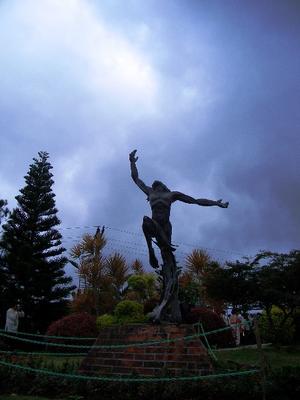
Twenty-Second Sunday in Ordinary Time
Mt 16:21-27
Simon Peter loves Jesus. He left his fishing trade for Him. He exchanged his family for Him. He believes that He is the Christ, the Son of the Living God. He is willing to die for Him. He will protect and defend Him from any assault. He loves Him and wishes no harm to fall upon Him. But today Jesus calls Simon Peter “Satan”.
Immediately the Gospel reminds us of a very important lesson in life: Not all people who want to shield us from pain are true friends. Our relationship with people is now oriented by our relationship with God. Only people who help us obey God – no matter what obeying God entails – are our true friends. All the rest are enemies, adversaries, “Satan”. For “Satan” means anyone who hinders us from fulfilling God’s will in our life. Anyone who is an obstacle to our discipleship is a “Satan”. We might be surprised to realize that many of the people we call “friends” are actually “Satan” when measured against our relationship with God. Our relationship with God is the only criterion for our relationship with people. Our discipleship mainly defines our friendship.
No one draws a plan that includes failure. We may prepare for incidental set-backs but we do not intentionally make defeat an important factor in our scheme towards success. But not so with Jesus. His victory is precisely in His seeming defeat. His resurrection is already in His death. His power is in His cross.
If the ultimate joy of any disciple is indeed in becoming like the Master, there is no other way for us but to include death in our living and to welcome the cross in our following Him. This does not mean that we create our own cross and cause our own death. This does not mean that we go around and carry the cross of others. This does not mean that we foolishly risk our selves so as to die and call our death “an offering to God.” It means, rather, that if fulfilling the will of God demands our life, we are willing to lay it down. It means that if persecution, trials, sickness, and even death are consequences of obedience to God, we will still obey Him. It means that if in following Jesus we are brought right before the cross, we will not simply stare at the cross, much less run away from it, but rather carry the cross and, with Jesus, be crucified to it.
It is totally absurd to include failure in our vision of victory. It is completely illogical to welcome defeat in our plan for triumph. This is, in the words of Fr. Bernard Lonergan, a respected Jesuit theologian, “The Law of the Cross”. And as the maxim says, “Dura lex sed lex.” “The law is hard but it is the law.” There is no other way by which we can become like Jesus except through the Law of the Cross.
The Law of the Cross is not a set of commandments. The Law of the Cross is a spirituality of dying and rising and dying and rising and dying and rising with Christ. It is the law of laying down one’s life as Jesus did in obedience to the Father and thereby becoming life itself. It is the law of love that kept Jesus crucified on the cross more than what the nails in His hands and feet could accomplish. It is the law of loving like Jesus, living like Jesus, dying like Jesus, and rising like Jesus. The Law of the Cross is the Paschal Mystery of the Lord.
“Unless the grain of wheat falls to the earth and dies, it remains a grain of wheat; but if it dies, it bears much fruit” (Jn 12:24) – this is the Law of the Cross. “I came that you may have life and life in abundance” – this is the spirit of the Law of the Cross. The Law of the Cross is the life of any disciple. It is our life. It is our life after having been found by the Love that searched for us and made us see as it searched for Zaccahaeus and restored the sight of the man born blind. To hinder it is to be lost again. To stifle it is to be blind again. To deviate from it is to be Satan.
Simon Peter cannot accept the reality of the cross in the life of Jesus whom he has just acknowledged to be the Christ in the verses that immediately precede the Gospel today. This clearly shows to what direction human inclination is usually bent. It is the direction that points to gain without pain, to glory without agony, to discipleship without the cross. This is not the path that lies ahead every follower of Jesus. This is, rather, the road that leads to hell. This is not where Jesus is inviting us. He beckons us to the Kingdom of God.
Once a man talked to the Lord and said, “Lord, I want to cross the seas and reach the shores of heaven. What boat should I sail with?” Jesus answered, “The cross.” A second time the same man said to Jesus, “If heaven were above the ground, tell me, Lord, what ladder should I climb?” The Lord answered, “The cross.” A third time the same man asked the Lord, “If I were standing right outside the gates of heaven, O Lord, what key should I turn?” And Jesus answered, “The cross.”
There is no other way for us, disciples of Jesus, but the way of the cross. There is no other life for us, lovers of the Lord, but the Law of the Cross. But there is no other end that awaits us except the resurrection.
We do not have to wait till our sufferings on account of the Gospel cease before we experience the glory of our discipleship. As it is for John the Evangelist and for Fr. Lonergan the Jesuit theologian, let us already see in our sufferings our glory, in our defeat our victory, in our death our rising, in our cross our graces. St. Paul wrote in one of his epistles, “I count everything rubbish except to share in the cross of Christ.” Way back in my seminary days, I fell in loved with a song we sing in the liturgy:
Only this I want
but to know the Lord;
and to bear His cross
so to wear the crown
He wore.
We already wear His crown even as we bear His cross.































